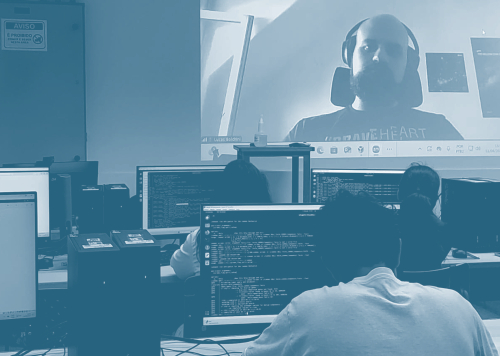2025 is shaping up to be a milestone year for biosecurity and DNA synthesis screening. From the U.S. Executive Order on Biological Research Safety to the 50th anniversary of the Biological Weapons Convention, the world is increasingly aware of the immense power synthetic biology holds, along with its associated risks. While countries like the United States and the United Kingdom continue refining their screening frameworks and guidelines, these discussions are still largely absent from the Global South.
On 11 June, a Portuguese-language hybrid workshop co-organized by IBBIS, UNICAMP’s Synthetic Biology League, and SynBioBR brought together Brazilian students and researchers to confront these issues head-on. For the first time, the Common Mechanism was used in an educational setting, offering participants a hands-on introduction to DNA synthesis screening, and reflecting a growing commitment to advancing biosecurity in the Global South.
 IBBIS Technical Consultant Lucas Boldrini presents to students and researchers.
IBBIS Technical Consultant Lucas Boldrini presents to students and researchers.
In this two-hour session, 27 participants — including students, researchers and industry professionals — engaged in a hands-on exercise with the Common Mechanism chaired by IBBIS Technical Consultant Lucas Boldrini. In a simulated DNA synthesis screening workflow, attendees worked in small groups to assess synthetic DNA orders using the open-source tool. This was followed by IBBIS’s Customer Screening game, which debuted at the 2024 iGEM Responsibility Conference in Paris and was, for the first time, implemented in a hybrid format. Participants evaluated fictional personas whose orders had been flagged by the Common Mechanism, applying due diligence principles in a realistic scenario. The two exercises concluded with an open discussion, where attendees reflected on the screening process and the challenges of responsible DNA synthesis screening.
IBBIS’s work is urgent and we need to anticipate the risks. The workshop’s format was great for raising awareness about the importance of DNA synthesis screening. I loved seeing a young crowd involved, not just researchers. It’s great to reach people at the beginning of their careers. — Rachel Marascalchi (Exxtend)
Beyond training participants on a technical tool, the workshop served as a testbed for a scalable educational format that can be adapted and shared across other institutions and conducted in multiple languages. Feedback collected during the session helped improve the workshop’s format and IBBIS’s resources. The event also demonstrated that biosecurity governance doesn’t have to be centralized in the Global North. It can and should be driven by local actors with global awareness, as IBBIS aims to continue building a strong foundation for responsible synthetic biology that is accessible to everyone, everywhere.
